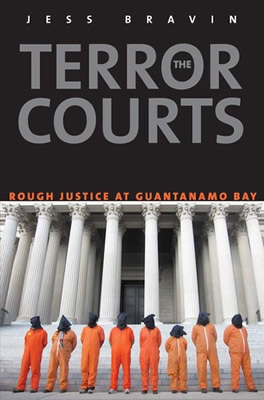 The Terror Courts: Rough Justice at Guantanamo Bay
The Terror Courts: Rough Justice at Guantanamo Bay
Yale University Press, 2013
Agent: Sandra Dijkstra
Soon after the September 11 attacks in 2001, the United States captured hundreds of suspected al-Qaeda terrorists in Afghanistan and around the world. By the following January the first of these prisoners arrived at the U.S. military's prison camp in Guantanamo Bay, Cuba, where they were subject to President George W. Bush's executive order authorizing their trial by military commissions. Jess Bravin, the Wall Street Journal's Supreme Court correspondent, was there within days of the prison's opening, and has continued ever since to cover the U.S. effort to create a parallel justice system for enemy aliens. A maze of legal, political, and moral issues has stood in the way of justice: issues often raised by military prosecutors who found themselves torn between duty to the chain of command and their commitment to fundamental American values.
While much has been written about Guantanamo and brutal detention practices following 9/11, Bravin is the first to go inside the Pentagon's prosecution team to expose the real-world legal consequences of those policies. Bravin describes cases undermined by inadmissible evidence obtained through torture, clashes between military lawyers and administration appointees, and political interference in criminal prosecutions that would be shocking within the traditional civilian and military justice systems. With the Obama administration planning to try the alleged 9/11 conspirators at Guantanamo, and vindicate the legal experiment the Bush administration could barely get off the ground, The Terror Courts could not be more timely.
Accolades:
Washington Post Notable Nonfiction for 2013
Top Ten Investigative Journalism Books of 2013- Nieman Reports
Top Five Finalist for Silver Gavel Award
Reviews:
“Most readers probably know that the military commissions have not been a great success, but the core accomplishment of Bravin’s book is to bring home the scope of the disaster, and the profound diffculties from which American justice will now have to extricate itself. Its excellence consists in telling this story on a scale that is human and engaging.”
—International Affairs
“A book that pulls no punches. It names names. And in so doing, it is a gutsy, finely wrought narrative that explains how a small group of Bush-era political appointees managed to develop a parallel justice system designed to ensure a specific outcome."
—Washington Post
“Tells the story of the evolution of Guantanamo's legal universe in captivating detail, and provides the reader with a clear picture of just how we arrived at this bizarre moment in our history.”
— Rolling Stone
"A damning, brave book by an author who is legitimately outraged by what he uncovered."
—Kirkus Reviews
“Bravin brings cohesion and drama to the story, which is a genuine public service… Bravin does a masterful job documenting the flaws in the military commission system and describing the petty bureaucrats who tried to cover them up. He is not soft on the detainees, and in fact reveals a number of new details showing how deeply and dangerousloy some were involved in Al Qaeda… These are not easy stories to tell, but Bravin sketches them ably, bringing to life not just the arguments on both sides, but the personalities and motivations of the main players from Bush to Obama.”
—Democracy Journal
“Besides its value in synthesizing many sources into an accessible history, the strengths of Mr. Bravin’s account are the moments when he takes us inside the secretive prosecutors’ office… Mr. Bravin’s book is a welcome addition to the history of national security legal policy dilemmas in the Bush era…”
—New York Times
“…a remarkable job by one of the news media’s most persistent reporters on matters of law and national security. Bravin penetrated a system designed for railroading prisoners in near-total secrecy, and he demonstrated the persistence of many ordinary – and some extraordinary – Americans’ visceral devotion to such quaint notions as the presumption of innocence and the rule of law.”
—Reason
“…exhaustive and highly disturbing history of the nation’s shadow justice system.” “The Terror Courts may read like a thriller at times, but really it’s something else: a bona fide American tragedy.”
—NPR
“The first inside account of America’s continuing legal experiment at Guantanamo Bay – a permanent, offshore justice system design to assure convictions by denying constitutional rights.”
—Publishers Weekly
“A great read. A very well informed account of the contest between fundamental legal principle and American values against political rhetoric and expediency in the setting up land applying of the process of rough justice for the alleged terrorists after 9/11. A contest in large part between the career military lawyers against the politicians and the politically appointed lawyers.”
—Sir Kenneth Keith, Judge, International Court of Justice
"Jess Bravin’s The Terror Courts is thethe definitive account of the legal aftermath of 9/11—and the still-unsettled legacy of the decisions made in those frenzied days."
—Jeffrey Toobin, author of The Oath: The Obama White House vs. the Supreme Court
“Excellent. . .You should read this book now, while the hunger strike at Guantanamo Bay is growing. You should read it now, while there is a pending request by the Pentagon to spend another $49 million for a new prison on Cuba. You should read it now, while John
Yoo is still the go-to guy for quotes about interrogations, and while Senators John McCain
and Lindsey Graham, crows on a wire, are still offering up terrible advice about prosecuting detainees.”
—The Atlantic